#It is a time of spiritual and physical fulfillment that reinforces love
Explore tagged Tumblr posts
Note
i know that's a silly and nerdy little question, but somehow i'm still into it. how many times do you think the "average" jellicle couple fucks in a week?
It is not a silly or nerdy question to me anon, so keep them coming. As much as sex is pleasurable and fun (and it would be), I think it is a good way for two people to connect in a way that nothing else can quite match. Physical intimacy between a couple is extending a form of love and care into a relationship dynamic that essentially no one else outside of said couple can have. It is needless to explain how special that is.
Anyway, to answer your question I would say that it varies a fair bit between any given couple.
For Victoria and Plato, they have straight up all-they-can-muster passionate sex at least once or twice a week. They have a hard time keeping their paws to themselves, always waiting to hold the other or embrace in some way. Not only that, they are constantly kissing when they are together. Unsurprisingly, it oftentimes translates to them fucking out the feelings of immense love and lust that they will never grow tired of.
Rumple and Mungo fuck in some way or another basically every single day. Mutually operating out of pure hedonism, Rumple more than Mungo sexually, they are in a constant search for excitement and pleasure. The fucking does not even need to be something big or lengthy (that's what she said) either, as some fingering / jerking or oral love goes more than a long way to start off, elevate, or close out another day. Though, it all gets conflated enough that the smaller acts become them mounting the other before long. Who can blame them.
Cass and Alonzo fuck at least once a week, and they always ensure it is something for the ages. Nothing overly complicated by any means, but very little nothing is a special for the tom as Cass' perfect pussy. It is the stuff of legends and myths. They use up all available energy when they fuck, battling it out position and domination wise. Cass always wins those though, not the Alonzo minds.
Bomba and Tugger are a couple that varies. Sometimes it is three or four times a week when they are really hungry for the other, other times it is a more sustainable once a week or less. It depends on how great the sex ends up being. Short sessions are great, and lead to more short fucking times in the day(s) that follows. When the sex is a more involved affair, it keeps them satisfied for longer.
Deme and Munk try to set aside a weekly rendezvous, but it frequently gets hampered by other adult responsibilities. Their fucking comes in quick bursts to make up for lost time if a dry spell goes on longer than a week. Otherwise, if it ends up being a long time, they have a marathon fuck session that goes on for hours to ensure everything is (literally) out of their system.
Jelly and AGus still find time to fool around here and there, but more structured sex is not overly common. It happens more out of spontaneity than any planned interval.
For those without a definitive partner, sex is obviously not on any committed time-line. Tanto fucks infrequently based on when her partners are available, and those times are certainly capitalized on. Jenny fucks based on how often Busto (or Skimble) is around, so it ends up being less frequent.
#First ask of 2024! Thanks for this anon#send more asks please#I get being Mungo and getting a piece of Rumple whenever you can#Even if it is probably her initiating it to begin with at points#The best sex is between vic and Plato#It is a time of spiritual and physical fulfillment that reinforces love
1 note
·
View note
Text
Current Love Energies: What's Happening in Your Love Life Now? 💖✨🔮 Pick a Pile to Reveal the Vibes!
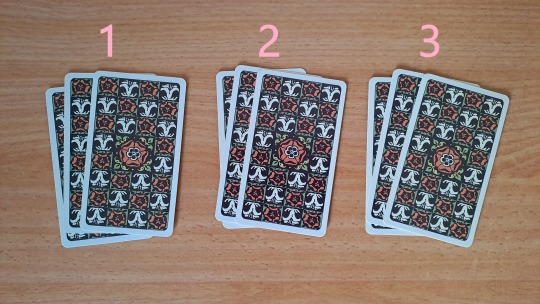
Instructions: Look at the 3 images of the piles below. Choose the pile that you feel most drawn to. Trust your intuition and select the one that resonates with you the most. Once you have made your choice, scroll down to read the description for the pile you selected.
I put a lot of effort into this reading, so please show some love by leaving comments, likes, reblogs, and follow me! ❤️💬✨
Paid psychic reading (7 questions for just $7) is available here:
Pile 1 ���🃏🃏
Cards: The Lovers, The Two of Cups, The Ace of Wands
The Lovers card indicates a strong connection, possibly a soulmate or twin flame energy. The Two of Cups reinforces this, showing mutual feelings and deep emotional bonds. The Ace of Wands brings in a spark of passion and new beginnings, suggesting that your love life is currently filled with both emotional and physical connection, and there might be an exciting new development on the horizon.
Together, these cards reveal that your current love energy is vibrant and connected, with strong potential for deepening bonds and passionate new experiences. 💞🔥💫
Love this post? Spread the positive vibes by reblogging with your favorite pile number! Remember to like, comment, and follow me for more tarot insights and spiritual guidance. By sharing this post, you'll invite positive energy from the universe into your life. Let's journey together towards enlightenment and fulfillment!
Pile 2 🃏🃏🃏
Cards: The Three of Swords, The Five of Cups, The Tower
The Three of Swords indicates heartache or emotional pain, while the Five of Cups suggests feelings of loss or regret. The Tower signifies sudden changes or upheaval. Right now, your love life might be going through a difficult time, with challenges that require healing and rebuilding. While this energy may be tough, it's important to remember that growth and transformation often follow moments of crisis.
Together, these cards show that your love life is currently experiencing turbulence, but this could lead to important lessons and a stronger foundation in the future. 💔😢💥
Love this post? Spread the positive vibes by reblogging with your favorite pile number! Remember to like, comment, and follow me for more tarot insights and spiritual guidance. By sharing this post, you'll invite positive energy from the universe into your life. Let's journey together towards enlightenment and fulfillment!
Pile 3 🃏🃏🃏
Cards: The Star, The Knight of Cups, The Six of Pentacles
The Star brings hope and renewal, suggesting a period of healing and optimism in your love life. The Knight of Cups indicates romantic gestures and offers, possibly from someone who is deeply interested in you. The Six of Pentacles shows balance and equal give-and-take, hinting that your current love energy is one of mutual respect and support.
Together, these cards reveal a positive and hopeful energy in your love life, with potential for romantic advances and a balanced, nurturing connection. 🌟💌🤲
Love this post? Spread the positive vibes by reblogging with your favorite pile number! Remember to like, comment, and follow me for more tarot insights and spiritual guidance. By sharing this post, you'll invite positive energy from the universe into your life. Let's journey together towards enlightenment and fulfillment!
Attention! This reading is for entertainment purposes only. This tarot reading does not give a 100% guarantee that all the described situations will occur or being ultimate truth. You build your own life and destiny and only you know yourself best. Remember to reblog, like, comment, and follow for more cosmic guidance and positivity!
Paid readings (7 questions for just $7) are also available for more in-depth insights and personal guidance! 🌟💫
#divination#psychic#tarot reading#free readings#pick a card#pick a pile#free tarot#daily tarot#tarot community#tarotblr#tarot cards#tarot#future spouse#astrology#spirituality#crystals#witchcraft#meditation#manifestation#witchblr#spiritualawakening#mysticism#numerology#occult#wicca#tarot deck#shifting
20 notes
·
View notes
Text
"Embracing Faith: Journeying Together as a Church Community"
By: Evangeline B. Padilla BSBA-FM ( TTH GE5) (9:00-10:30)
A church community embodies the essence of unity. It is a place where individuals from diverse backgrounds come together, united by a common faith and purpose. This unity is not just about physical proximity but about emotional and spiritual connection. It is about supporting one another through life’s joys and challenges, celebrating milestones, and providing comfort in times of sorrow. One of the most profound aspects of a church community is the support network it provides. Life’s journey is fraught with challenges, and having a community to lean on can make all the difference. Whether it’s through prayer, counseling, or simply being present, the church offers a sanctuary of encouragement and strength. This support extends beyond the spiritual, often encompassing emotional and practical assistance, reinforcing the idea that we are never truly alone.

Service is another critical component of a church community. Through acts of kindness, charity, and outreach, we live out the teachings of Christ. These collective efforts not only help those in need but also strengthen the bonds within the community. Working together towards a common goal fosters a sense of purpose and fulfillment, reinforcing the idea that faith is both an inward and outward expression of love. Embracing faith and journeying together as a church community is a profound and enriching experience. It offers strength in unity, opportunities for spiritual growth, and a robust support network. It celebrates diversity and collective worship, and it navigates challenges with resilience and grace.
Photos by, Sta. Agueda Parish.



2 notes
·
View notes
Text
The Importance of Self-Care in Addiction Recovery

Addiction recovery is a transformative journey that requires addressing not only the physical aspects of addiction but also the mental, emotional, and spiritual well-being of an individual. Self-care is an essential part of this process, as it nurtures resilience, reduces stress, and fosters a healthier lifestyle. By prioritizing self-care, individuals can enhance their ability to maintain sobriety and build a fulfilling life beyond addiction.
What is Self-Care?
Self-care involves intentional actions to care for your physical, mental, and emotional health. It is about making choices that promote well-being and reduce stress. In addiction recovery, self-care becomes a cornerstone of rebuilding a balanced and healthy life.
Why is Self-Care Crucial in Recovery?
Helps Manage Stress: Stress is a common trigger for relapse. Self-care practices like mindfulness, exercise, and relaxation techniques help reduce stress and improve coping mechanisms.
Restores Physical Health: Addiction often takes a toll on the body. Proper nutrition, sleep, and exercise can help heal the physical damage and improve energy levels.
Builds Emotional Resilience: Self-care fosters emotional stability, helping individuals manage feelings of anxiety, depression, or guilt that may arise during recovery.
Supports Mental Clarity: Activities like journaling, meditation, or therapy improve mental focus and self-awareness, aiding in better decision-making.
Boosts Self-Esteem: Taking care of oneself reinforces self-worth and confidence, which are vital for long-term recovery.
Key Areas of Self-Care in Recovery
1. Physical Self-Care
Nutrition: A balanced diet helps repair the body and boosts energy. Include whole foods rich in vitamins and nutrients to support physical recovery.
Exercise: Regular physical activity releases endorphins, reduces cravings, and improves overall mood.
Sleep: Prioritize quality sleep to enhance physical and mental recovery. Create a bedtime routine to improve sleep patterns.
2. Emotional Self-Care
Journaling: Writing down thoughts and feelings can help process emotions and track progress.
Therapy: Speaking with a counselor or therapist provides a safe space to explore emotions and challenges.
Creative Outlets: Engage in activities like painting, music, or writing to express emotions in a healthy way.
3. Mental Self-Care
Mindfulness and Meditation: These practices improve focus, reduce stress, and promote self-awareness.
Reading and Learning: Expanding knowledge about addiction and recovery empowers individuals to make informed choices.
Challenging Negative Thoughts: Work on identifying and replacing self-critical or negative thought patterns with positive affirmations.
4. Social Self-Care
Building a Support Network: Surround yourself with supportive friends, family, or peers in recovery groups.
Setting Boundaries: Learn to say no to unhealthy relationships or environments that may jeopardize sobriety.
Quality Time with Loved Ones: Reconnect with family and friends who contribute positively to your recovery journey.
5. Spiritual Self-Care
Meditation and Prayer: For those who are spiritually inclined, these practices can provide comfort and guidance.
Connecting with Nature: Spending time outdoors fosters a sense of peace and connectedness.
Gratitude Practice: Reflect on things you are grateful for to cultivate a positive outlook.
Practical Tips for Incorporating Self-Care
Create a Routine: Establish a daily schedule that includes time for exercise, relaxation, and other self-care activities.
Start Small: Begin with simple practices like drinking more water or taking short walks, then build from there.
Set Goals: Identify specific self-care goals and track your progress to stay motivated.
Seek Support: Engage with a therapist, sponsor, or recovery group to help maintain accountability.
Be Patient: Recovery is a journey, and self-care practices take time to yield results.
Overcoming Barriers to Self-Care
It’s common for individuals in recovery to struggle with prioritizing self-care, especially if guilt, shame, or low self-esteem are present. To overcome these barriers:
Remind yourself that self-care is not selfish; it is necessary for recovery.
Focus on the benefits self-care brings to your overall well-being and relationships.
Seek encouragement and guidance from your support system. #AddictionFree.
Final Thoughts
Self-care is not a luxury; it is a vital component of addiction recovery. By nurturing your physical, emotional, and mental health, you equip yourself with the tools needed to stay sober and thrive. Remember, recovery is about more than abstaining from substances—it’s about creating a life of balance, joy, and fulfillment.
#SelfCareInRecovery#HealingThroughSelfCare#RecoveryAndSelfCare#PrioritizeYourself#NurtureYourRecovery#SelfCareMatters#MentalHealthRecovery#SelfLoveInRecovery#AddictionRecoveryJourney#SelfCareForSoberLiving
0 notes
Text
The Relationship Between Yoga and Self-Love
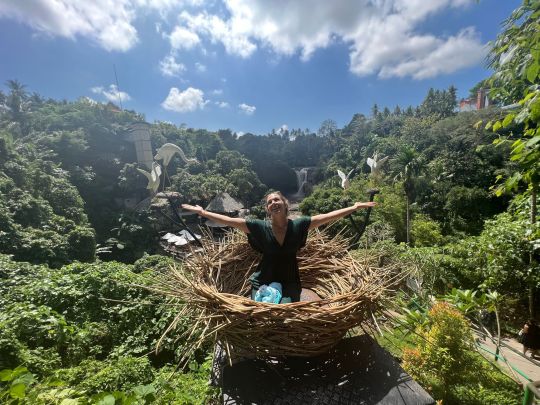
In a world where we are constantly navigating challenges, expectations, and self-doubt, finding time to nurture self-love can be transformative. Yoga serves as a profound pathway to cultivating self-awareness and unconditional self-acceptance. Beyond its physical postures, yoga invites us to explore a deeper connection with ourselves, fostering self-love in ways that ripple into all areas of life.
Understanding Self-Love Through Yoga
Self-love isn't just about pampering oneself; it's about embracing your true self, flaws and all. Yoga integrates the mind, body, and spirit, teaching us to honor ourselves in the present moment. Through consistent practice, yoga encourages introspection and offers tools to combat negative self-perceptions.
The Journey to Self-Love with Yoga
Mindfulness and Awareness
Yoga emphasizes being present in the moment. Whether you are holding a pose in Hatha yoga or flowing through a sequence in Vinyasa, the practice directs your focus inward. By cultivating mindfulness, you become more aware of your thoughts and patterns, helping you address self-critical tendencies with compassion.
Building Confidence
Yoga is a journey of progress, not perfection. Each session allows you to witness your own growth, whether it’s achieving a challenging pose or simply improving your breath control. These small victories build self-confidence, reinforcing your belief in your abilities.
Connecting With Your Inner Self
Practices such as Yin yoga and meditation provide a serene space for self-reflection. They encourage you to look within, understanding your emotions and fostering a deeper connection with your authentic self.
Releasing Emotional Blockages
Stored emotions often manifest as physical tension. Through yoga, especially with practices like 200-hour yoga teacher training in Bali, participants learn how specific poses release pent-up emotions, creating a sense of freedom and emotional clarity.
Practicing Gratitude
Yoga often incorporates affirmations and gratitude practices. These help shift your focus from what you lack to what you already possess, promoting a sense of fulfillment and self-acceptance.
Why Choose Yoga Teacher Training to Deepen Self-Love?
While regular yoga practice is beneficial, diving into a Yoga Teacher Training in Bali provides an immersive experience. Ubud, Bali’s spiritual heart, offers a serene backdrop for self-discovery. Training programs such as the 100-hour yoga teacher training Bali and 300-hour yoga teacher training Bali are designed not just to teach asanas but also to guide you in understanding the philosophy of yoga and its role in fostering self-love.
Through these programs, participants learn techniques that balance the body and mind, nurture inner peace, and encourage self-compassion. The best yoga teacher training in Bali ensures that the journey goes beyond certifications, helping you find harmony within yourself.
Yoga and the Art of Acceptance
Yoga teaches us the art of acceptance—accepting our limitations, our strengths, and our imperfections. It helps us realize that self-love is not conditional on achievements or external validation but is a state of being.
Practicing affordable yoga teacher training Bali programs can be an excellent step for those wanting to delve deeper into yoga's philosophy while making it accessible to all.
How to Cultivate Self-Love Through Yoga
Create a Routine: Commit to a daily practice, even if it’s just 15 minutes of mindful breathing or a few gentle stretches.
Embrace Affirmations: Incorporate positive affirmations into your practice, such as “I am enough” or “I love and accept myself.”
Be Patient: Growth takes time. Allow yourself to progress at your own pace, without comparing your journey to others.
Choose the Right Guidance: Opt for training programs like the 200-hour yoga teacher training Bali to deepen your practice and understanding.
Celebrate Small Wins: Acknowledge and celebrate your efforts and progress, no matter how small.
Conclusion Yoga offers a sanctuary where self-love can flourish. It’s not just about physical fitness; it’s about becoming your own best friend, accepting yourself wholeheartedly, and nurturing your well-being. Whether you’re embarking on a yoga journey or exploring yoga teacher training in Bali, you’ll discover that yoga holds the key to unlocking unconditional self-love. By integrating yoga into your life, you embark on a beautiful journey of self-discovery, acceptance, and love—a gift that transforms not just you, but everyone you touch
#Maa Shakti Yog Bali#Yoga Teacher Training in Bali#Yoga Teacher Training Bali#Ubud#200 hour yoga teacher training Bali#Best Yoga Teacher Training in Bali#100 hour yoga teacher training Bali#300 hour Yoga Teacher Training Bali#Affordable yoga teacher training Bali
0 notes
Text
Traditional Outfits for Varalakshmi Celebrations
Varalakshmi Vratam is a cherished Hindu festival, particularly in South India, where married women seek the blessings of Goddess Lakshmi for the prosperity, health, and happiness of their families. The day is marked by sacred rituals, community gatherings, and the donning of traditional attire, especially silk sarees, which are symbolic of the goddess’s grace and elegance. This guide will walk you through the essence of the Varalakshmi celebration, how to observe it, and the perfect saree choices to make this occasion even more special.
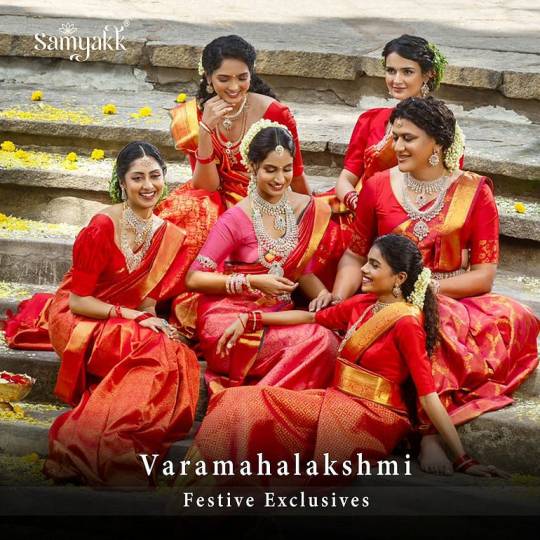
Understanding the Spiritual Significance of Varalakshmi Vratam
Varalakshmi Vratam is more than just a festival; it is a profound spiritual practice that underscores the importance of devotion, discipline, and family values. Celebrated on the second Friday of the Shravana month (July-August), this festival is dedicated to Varalakshmi, the boon-granting form of Goddess Lakshmi.
The day begins with thorough house cleaning, as a clean home is believed to invite the goddess’s blessings. Women draw intricate rangoli designs at their doorsteps, symbolizing welcome and prosperity. The kalasha, a sacred pot filled with water, rice, and coins, is adorned with mango leaves and a coconut, representing the goddess herself. Special prayers are offered, invoking her presence and seeking her blessings for wealth and well-being.
“Varalakshmi Vratam is a celebration of devotion, discipline, and the divine feminine energy, where tradition meets spirituality.”
The rituals continue with fasting, prayers, and the distribution of prasad, a blessed offering shared among family and friends. Women also dress in their finest sarees and jewelry, embodying the grace and prosperity that Goddess Lakshmi represents. The essence of Varalakshmi Vratam lies not just in material wealth but in spiritual growth and familial harmony.
Step-by-Step Guide to Celebrate Varalakshmi Vratam
Celebrating Varalakshmi Vratam is a beautiful experience that connects the physical with the spiritual. Embrace the sanctity: Your guide to a fulfilling day.
1. Preparation for the Day: Begin with thorough house cleaning to create a sanctified space for the goddess. Decorate the puja area with flowers, lamps, and rangoli designs. Gather all necessary items for the puja, such as the kalasha, coconuts, mango leaves, and prasad.
Observing the Fast: Many women observe fasting on this day as a form of devotion. Fasting not only shows discipline but also helps focus the mind on spiritual matters. Typically, the fast is broken after the puja with a meal of traditional delicacies.
Performing the Varalakshmi Vratam Puja: The puja is the heart of the celebration. Begin by invoking Lord Ganesha to remove obstacles, followed by the main puja dedicated to Goddess Lakshmi. Chant mantras, recite the Varalakshmi Vratam story, and offer flowers, fruits, and sweets to the goddess.
Dressing in Traditional Attire: Wearing a traditional saree is a crucial part of the celebration. Silk sarees are the preferred choice, symbolizing purity, wealth, and grace. Adorn yourself with jewelry to embody the beauty of Goddess Lakshmi.
Sharing Blessings and Prasad: After the puja, share the prasad with family members and neighbors. This act of giving symbolizes the sharing of blessings and strengthens communal bonds.
Socializing and Strengthening Bonds: Varalakshmi Vratam is also a time to visit friends and relatives, exchange sweets, and share blessings, reinforcing the bonds of love and friendship.
Why Kanchipuram Silk Sarees Are Perfect for Varalakshmi Vratam
Kanchipuram silk sarees are synonymous with South Indian tradition and grandeur, making them an ideal choice for Varalakshmi Vratam. These sarees, woven from pure mulberry silk, are known for their durability, rich texture, and vibrant colors. The intricate zari work and bold borders add a touch of opulence that perfectly complements the auspiciousness of the occasion.

Wearing a Kanchipuram silk saree for the Varalakshmi Vratam is not just about looking beautiful but also about embracing a rich cultural heritage that has been passed down through generations. The saree’s craftsmanship reflects the devotion and care with which the celebration is observed, making it a perfect symbol of the day’s spiritual significance.
The Timeless Beauty of Banarasi Silk Sarees
Banarasi silk sarees are another excellent choice for Varalakshmi Vratam, known for their luxurious fabric and exquisite brocade work. Originating from the holy city of Varanasi, these sarees have been worn by Indian women for centuries during important festivals and weddings.

The intricate designs, often featuring motifs inspired by Mughal art, add a regal touch to your ensemble. Wearing a Banarasi silk saree during Varalakshmi Vratam allows you to feel like a queen as you offer prayers to the goddess, making the celebration even more special.
Mysore Silk Sarees Blend Simplicity and Sophistication
Mysore silk sarees are known for their simplicity, elegance, and smooth texture, making them a comfortable and sophisticated choice for Varalakshmi Vratam. These sarees are lightweight, easy to drape, and come in a range of vibrant colors with pure gold zari borders.

Opting for a Mysore silk saree for this occasion is perfect for those who prefer understated elegance. The saree’s minimalistic design reflects purity and devotion, two qualities that resonate with the spirit of Varalakshmi Vratam.
Paithani Silk Sarees from Maharashtra Are Perfect for Varalakshmi
Paithani silk sarees are a true representation of Maharashtra’s rich textile heritage. Characterized by their vibrant colors and distinctive peacock motifs, these sarees are woven with gold and silver threads, creating a dazzling effect that is both traditional and festive.

Wearing a Paithani silk saree for Varalakshmi Vratam adds a unique touch of tradition and artistry to your celebration. The saree’s elaborate designs and rich texture make it a striking choice for honoring the goddess with grandeur and style.
Gadwal Silk Sarees Are the Perfect Blend of Comfort and Tradition
Gadwal silk sarees are known for their distinctive blend of silk and cotton, making them a lightweight and comfortable option for the long hours of Varalakshmi Vratam rituals. These sarees are famous for their contrasting borders and intricate zari work, adding a festive flair to your traditional attire.

Choosing a Gadwal silk saree allows you to experience the comfort of cotton with the elegance of silk, making it an ideal choice for a day filled with devotion and celebration.
Tussar Silk Sarees Offer Earthy Elegance for Varalakshmi
Tussar silk sarees are cherished for their natural golden sheen and rich texture. These sarees, often adorned with delicate embroidery or hand-painted designs, are sophisticated choices for Varalakshmi Vratam.

The earthy tones and subtle elegance of Tussar silk sarees symbolize the purity and serenity associated with the goddess, making them a perfect choice for the occasion. Their understated beauty allows you to focus on the spiritual aspects of the celebration while still looking graceful and stylish.
Chanderi Silk Sarees Are Light and Elegant for Varalakshmi
Chanderi silk sarees offer a perfect blend of silk and cotton, known for their lightweight and glossy finish. The unique motifs, such as peacocks, flowers, and geometric patterns, make these sarees versatile options for festive occasions like Varalakshmi Vratam.

Wearing a Chanderi silk saree during Varalakshmi Vratam adds a touch of understated elegance to your traditional attire. These sarees are perfect for those who prefer a lighter, more comfortable saree that still exudes grace and beauty.
Patola Silk Sarees Are Vibrant and Auspicious for Varalakshmi Vratam
Patola silk sarees are renowned for their vibrant colors and intricate double ikat weaves, making them a striking choice for Varalakshmi Vratam. Originating from Gujarat, these sarees are considered highly auspicious and are often worn for special occasions.

The bold designs and rich texture of Patola silk sarees make them a standout choice for the celebration, allowing you to honor the goddess with both tradition and flair.
Final Thoughts
Varalakshmi Vratam is a celebration of devotion, tradition, and the divine feminine. As you prepare to honor Goddess Lakshmi, selecting the right saree can enhance both the spiritual and cultural significance of the occasion. Whether you choose the regal Kanchipuram silk saree, the luxurious Banarasi silk saree, or the simple elegance of a Mysore silk saree, your attire will reflect your reverence for the goddess and your pride in Indian heritage. Let your saree speak volumes about your love for tradition, and make this Varalakshmi Vratam a day of grace, beauty, and spiritual fulfillment.
For those looking to find the perfect saree for this occasion, Samyakk offers a stunning collection that embodies the elegance and tradition of Varalakshmi Vratam.
Popular Searches: Kanjivaram Sarees || Banarasi Sarees || Designer Silk Sarees || Pure Handloom Silk Sarees || Chiniya Silk Sarees || Ikkat & Patola Saree || Kota Silk Saree || Pashmina Sarees || Printed Silk Saree || Pure Silk Saree || Festive Silk Saree
#Silk Sarees for Varalakshmi#Traditional Sarees for Varalakshmi#Kanchipuram silk saree#Banarasi silk saree#Mysore silk saree#Paithani silk saree#Gadwal silk saree#Tussar silk saree#Chanderi silk saree#Patola silk saree#Varalakshmi Vratam#Varalakshmi Puja#Varalakshmi Celebration
0 notes
Text
Powerful Dua to Get Married to a Specific Person
Are you deeply in love with someone and dreaming of marrying them? In the journey of love, sometimes we find ourselves longing for a specific person to share our life with. When conventional methods of courtship seem insufficient, turning to the spiritual realm for guidance can offer solace and hope.
Islamic tradition provides a profound avenue through which believers can seek blessings and guidance for matters as crucial as marriage. Among these spiritual practices, dua to get married to a specific person (supplication) holds a special place, offering a direct channel to communicate heartfelt desires to Allah.

Understanding the Significance of Dua in Marriage
Dua is not merely a ritualistic act but a powerful means of expressing one's deepest aspirations and seeking Allah's favor. For those yearning to marry a specific person, Islamic teachings offer supplications that are believed to invoke Allah's mercy and blessings upon the desired union. It's a spiritual practice rooted in faith and humility, acknowledging that ultimate guidance and decisions lie with Allah.
Dua to Get Married to a Specific Person
Powerful Dua to Get Married to the Person You Want:
One of the most revered supplications in this context is to recite specific verses from the Quran and to invoke blessings upon the Prophet Muhammad (peace be upon him). The recitation of Durood Shareef, followed by heartfelt prayers, is believed to attract Allah's divine intervention in matters of the heart.
Wazifa to Marry a Specific Person:
A wazifa is a form of Islamic prayer involving specific verses or phrases repeated a certain number of times. In the quest to marry a specific person, believers often turn to wazifas that resonate with their intentions and invoke Allah's guidance and approval.
Dua for Getting Married to the Person You Want:
This supplication emphasizes the sincerity of one's intentions and the humility in seeking Allah's will. It reflects the profound belief in Allah's power to grant what is best for us, including the companionship and love of a specific person.
Steps to Perform the Dua
1. Perform Ablution (Wudu): Before embarking on any dua to get married to a specific person, it's essential to cleanse oneself physically and spiritually through ablution, symbolizing purity and readiness to communicate with Allah.
2. Recite Durood Shareef: Begin by reciting Durood Shareef nine times. This act honors and seeks blessings upon the Prophet Muhammad (peace be upon him), aligning one's supplication with the divine example.
3. Recite Quranic Verses: Specifically, verse 19 of Surah At-Tawbah holds significant spiritual weight in seeking Allah's blessings for marriage. Reciting this verse with sincerity and devotion reinforces the intention to marry the specific person you desire.
4. Recite Ayat: Repeat specific verses or phrases from the Quran, such as Ayat Al-Kursi or other verses that resonate with your intention to marry a specific person. The repetition of these verses amplifies the spiritual connection and reinforces faith in Allah's divine plan.
5. Offer Sincere Prayers: Finally, pour out your heart in sincere prayers to Allah. Express your love, intentions, and hopes for marrying the specific person. Trust in Allah's wisdom and timing, knowing that He listens to every earnest supplication.
Conclusion
In the journey of love and marriage, dua serves as a profound spiritual tool, offering solace and hope to those seeking Allah's blessings to marry a specific person. It encapsulates the belief that Allah's guidance and decisions are paramount, and through sincere supplication, believers can find peace and fulfillment in their heartfelt desires.
If you are longing to marry a specific person and seek Allah's blessings, consider incorporating these spiritual practices into your daily life. Trust in Allah's divine plan, and may your sincere dua bring you closer to the love and companionship you seek.
For more insights and guidance on powerful duas and wazifas for marriage, visit [ReciteDua.com](https://recitedua.com/dua-to-get-married-to-a-specific-person/). Embrace the spiritual journey towards a blessed union with the person you love, guided by faith and devotion.
0 notes
Text
"Harmony of Spirituality: Unraveling the Essence of Raag Gauri Sukhmani's Wisdom on Honest Living and Selfless Giving"
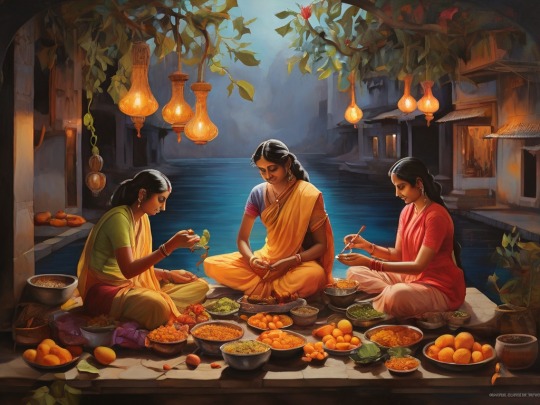
Raag Gauri Sukhmani, Mehla 5:
ਕਿਰਤੁ ਕਰਿ ਖਾਵਣੁ ਦਾਨੁ ਦੇਨ ॥ ਏਹ ਪੂਰਬੁ ਹੋਵੈ ਮਿਤ੍ਰ ਪ��ਆਰੇ ॥
Kirt kar khaavan daan den || Eih poorab hovai mitr piaare ||
Earn through honest work, eat, and share with others. This is the true fulfillment, dear
Prelude:
The mellifluous verses of Raag Gauri Sukhmani, composed by Guru Arjan Dev Ji in the soul-stirring ragas of Gauri, guide seekers on the path of spiritual enlightenment. Among its verses, the fifth Mehla imparts profound wisdom on leading a righteous life through the principles of honest work, mindful consumption, and selfless giving. This essay delves into the spiritual significance of the lines "Kirt kar khaavan daan den || Eih poorab hovai mitr piaare," emphasizing the interconnectedness of honest labour, responsible consumption, and altruistic generosity as essential components of a spiritually fulfilling existence.
I. The Spiritual Significance of Honest Work:
The phrase "Kirt kar" encapsulates the essence of righteous living through honest work. In a spiritual context, honest labour is not merely a means of livelihood but a way to align oneself with the divine order. The act of engaging in ethical and diligent work becomes a form of worship, a way to express gratitude for the skills and opportunities bestowed by the divine. By earning through righteous means, individuals contribute positively to the cosmic balance, fostering a sense of purpose and fulfillment.
Honest work serves as a vehicle for personal growth and self-realization. Through the challenges and triumphs encountered in the pursuit of one's vocation, individuals navigate the journey of self-discovery. This aligns with the spiritual notion that every individual is on a unique path toward realizing their true self, and honest work becomes a medium through which this realization unfolds.
II. Mindful Consumption: Nourishing the Body and Soul:
The directive to "khaavan" or eat is imbued with spiritual significance, emphasizing the importance of mindful consumption. In the pursuit of spiritual growth, individuals are encouraged to approach their dietary choices with consciousness and gratitude. Consuming food with awareness becomes a spiritual practice, acknowledging the interconnectedness of all living beings and recognizing the divine presence in the sustenance provided.
The act of eating transcends the physical and enters the realm of the metaphysical. By consciously choosing nourishing and ethical food, individuals honor the sanctity of life and contribute to a harmonious existence. The idea is to view the act of eating not as a mere biological necessity but as a sacred ritual that sustains both the body and the soul.
III. Selfless Giving: The Essence of True Fulfillment:
The call to "daan den" underscores the profound principle of selfless giving. In a spiritual context, generosity is not merely a charitable act; it is an expression of divine love and interconnectedness. By sharing the fruits of one's labour with others, individuals transcend the ego and cultivate a sense of unity with the broader human family.
Selfless giving extends beyond material possessions; it encompasses the sharing of time, knowledge, compassion, and love. In the act of giving without attachment to the outcome, individuals align themselves with the divine principle of unconditional love and service. This selfless giving becomes a transformative practice, purifying the heart and fostering a sense of fulfillment that transcends material wealth.
IV. The Interconnected Triad: Honest Work, Mindful Consumption, and Selfless Giving:
The verses "Kirt kar khaavan daan den" weave a tapestry of interconnected virtues that form the foundation of a spiritually harmonious life. Honest work, mindful consumption, and selfless giving are not isolated actions but a harmonious triad that reinforces and complements each other.
Honest work generates the resources for mindful consumption, fostering a sense of gratitude and responsibility toward the divine provisions. Mindful consumption, in turn, fuels the ability to engage in selfless giving, creating a cycle of positive energy and interconnectedness. This triad, when practiced with sincerity and awareness, becomes a transformative journey towards spiritual awakening and fulfillment.
Wrap-Up:
In unravelling the essence of Raag Gauri Sukhmani's wisdom, the verses "Kirt kar khaavan daan den" emerge as a guiding light on the path of spiritual evolution. Honest work, mindful consumption, and selfless giving form the pillars of a spiritually fulfilling life, weaving a tapestry of interconnected virtues that harmonize with the divine order. Through these practices, individuals not only contribute positively to their personal growth but also become instruments of positive change in the broader human community.
The spiritual significance lies in recognizing the sacredness of every action, from the labour that sustains us to the food that nourishes us and the generosity that binds us together. In embracing this interconnected triad, individuals embark on a transformative journey, transcending the limitations of the ego and aligning themselves with the universal principles of love, service, and gratitude. Raag Gauri Sukhmani beckons seekers to embrace these principles, unlocking the door to a spiritually enriched and harmonious existence.
#SpiritualWisdom#RaagGauriSukhmani#HarmonyInAction#DivineOrder#HonestWork#MindfulConsumption#SelflessGiving#Interconnectedness#SpiritualGrowth#Gratitude#Unity#Transformation#SoulfulLiving#Altruism#DivineLove#Service#Fulfillment#Enlightenment#SacredRituals#PositiveChange
0 notes
Text
Unlocking the Power of Dua: A Guide to Finding and Nurturing a Righteous Spouse
In the journey of life, finding a righteous and compatible life partner is a pursuit many embark upon with hope and anticipation. As individuals seek the blessings of a harmonious and fulfilling marriage, the power of dua (supplication) plays a significant role in shaping their destiny. This article delves into the depths of dua for a righteous spouse, offering guidance and prayers for those in search of a good husband or wife.
Dua for a Righteous Spouse: The Quran, the holy book of Islam, emphasizes the importance of seeking guidance from Allah in every aspect of life, including the search for a life partner. A heartfelt dua for a righteous spouse can be a powerful tool in aligning one’s intentions with the divine will. Muslims are encouraged to turn to Allah with sincerity and humility, expressing their desires and placing their trust in His wisdom.
Dua to Find a Good Spouse: The process of finding a good spouse can be both exciting and challenging. To navigate this journey, Muslims can recite specific supplications to seek Allah’s assistance. A commonly recited dua for finding a good spouse is to ask for a partner who possesses both piety and compatibility. Trusting Allah’s plan and timing, believers can recite this dua with conviction, knowing that their prayers are heard.

A Woman’s Dua for a Righteous Husband: For women aspiring to find a righteous husband, a special dua can be recited to invite Allah’s blessings into the search. This dua acknowledges the importance of compatibility, love, and righteousness in a marital relationship. By entrusting the process to Allah, women can cultivate patience and resilience while awaiting the arrival of a husband who is not only good but also aligned with their values.
Dua for a Good Husband: In Islam, the concept of a good husband goes beyond mere material or physical attributes. It encompasses qualities such as kindness, respect, and a commitment to righteousness. Believers can recite specific duas to seek Allah’s guidance in attracting and recognizing a husband with these virtues. This supplication acts as a beacon, guiding individuals towards a life partner who complements their spiritual and emotional needs.
Dua for Getting a Good Husband: As individuals earnestly pray for the manifestation of a good husband in their lives, they can recite heartfelt duas that express their sincere intentions and aspirations. This dua serves as a catalyst, invoking Allah’s divine intervention in the process of finding a life partner. Trusting in His plan, believers can find solace and assurance that their prayers are being heard and answered in due time.
Dua for a Good Relationship with Husband: Marriage is not only about finding the right partner but also about nurturing a healthy and harmonious relationship. Muslims can recite specific duas to strengthen the bond with their spouses, seeking Allah’s guidance in fostering love, understanding, and mutual respect. This dua becomes a continuous source of connection with the divine, reinforcing the commitment to building a lasting and fulfilling relationship.
Dua for a Good Spouse: In the pursuit of a good spouse, Muslims can turn to Allah with a general dua that encompasses all the qualities they seek in a life partner. This comprehensive supplication reflects a deep trust in Allah’s knowledge and wisdom, acknowledging that He knows what is best for His creation. Believers can recite this dua regularly, maintaining faith and patience throughout their journey.
In conclusion, the journey to finding a righteous spouse is a deeply personal and spiritual endeavour. Through the power of dua, individuals can seek Allah’s guidance, trusting in His plan and timing. As they recite these supplications with sincerity and conviction, they open their hearts to the divine intervention that paves the way for a blessed and fulfilling marital union.
#duaforgoodhusband#duaforrighteousspouse#duaforgettinggoodhusband#duaforgoodrelationshipwithhusband#dua#wazifa#islam#quran#husband#surah#ayat#love#marriage#wife
0 notes
Text
Navigating Life's Journey: Understanding Spirit Guides and Angels
Introduction
In the vast tapestry of existence, there are realms beyond what meets the eye. Many cultures and belief systems around the world posit the existence of benevolent beings who act as guides, guardians, and messengers for those on their earthly journey. These entities go by various names, but collectively, they are known as spirit guides and angels. In this article, we'll delve into the fascinating realm of spirit guides and angels, exploring who they are, their roles, and how they can positively impact our lives.
Who Are Spirit Guides?

Spirit guides are non-physical beings that offer guidance, support, and wisdom to individuals on their spiritual journey. They are believed to have a profound understanding of our life path, purpose, and challenges. While some perceive them as departed loved ones, others view them as ascended masters, elemental spirits, or even highly evolved entities from other dimensions.
Roles of Spirit Guides
Providing Guidance and Insights: Spirit guides are like wise mentors, offering insights and wisdom to help us navigate through life's twists and turns. They may communicate through dreams, intuition, or even in tangible signs and synchronicities.
Protection and Support: These benevolent beings act as our spiritual protectors, creating a shield of positive energy around us. They provide comfort during times of distress and help us overcome challenges.
Facilitating Growth and Learning: Spirit guides are invested in our personal growth and spiritual development. They encourage self-awareness, mindfulness, and the pursuit of knowledge.
Assisting in Decision-Making: When faced with significant life choices, spirit guides can offer guidance to help us align our decisions with our highest purpose and potential.
Healing and Balancing Energies: Some guides specialize in energy work, helping to restore balance and harmony in our physical, emotional, and spiritual bodies.
Understanding Angels
Angels are celestial beings known for their unconditional love, wisdom, and devotion to humanity. In various cultures and religions, angels are considered messengers of the Divine, tasked with delivering important messages, protection, and guidance. They are often depicted as beings of pure light, radiating a powerful and loving presence.
Roles of Angels
Messengers of Divine Wisdom: Angels act as intermediaries between the Divine and human beings, delivering messages of love, guidance, and hope.
Providing Protection and Comfort: Angels offer a sense of safety and comfort during challenging times. Many believe that invoking the presence of angels can create an atmosphere of peace and tranquility.
Assisting in Divine Assignments: Angels are said to assist individuals in fulfilling their soul's mission on Earth. They may provide nudges, signs, or synchronicities to steer us in the right direction.
Healing and Nurturing: Angels are often associated with healing energies. They can help mend emotional wounds, offer solace, and bring about a sense of well-being.
Invoking the Guidance of Spirit Guides and Angels
Meditation and Mindfulness: Practice meditation to quiet the mind and create a space for communication with your guides and angels.
Setting Intentions and Affirmations: Clearly state your intentions and ask for guidance, protection, or support. Use affirmations to reinforce your connection.
Trust Your Intuition: Pay attention to your inner knowing and subtle nudges. Trust that the guidance you receive is for your highest good.
Conclusion
Embracing the presence and wisdom of spirit guides and angels can be a transformative and empowering aspect of one's spiritual journey. By opening our hearts and minds to these benevolent beings, we invite their love, guidance, and protection into our lives. Remember, the connection with your guides and angels is unique and deeply personal. Trust in the process, and allow their light to illuminate your path.
#Angels#SpiritGuides#GuardianAngels#DivineGuidance#MessengerAngels#CelestialGuidance#AngelicPresence#SpiritualGuidance#AngelWisdom#IntuitiveGuidance#ConnectingWithAngels#AngelicRealm#GuidanceFromAbove#ChannelingAngels#AskYourAngels#TrustYourGuides#HigherGuidance#AngelsAmongUs#AngelicSupport#DivineMessengers#AngelicHealing#AngelBlessings#GuardianGuides#SpiritualJourney#EmbraceTheGuidance#AngelicIntuition#DivineLove#ConnectWithSpirits#LightWorkers#HealingAngels
0 notes
Text
Cultivating Self-Love: A Journey to Inner Fulfillment

Introduction
In a world that often emphasizes external validation and compares us to others, self-love has become a crucial antidote to feelings of inadequacy and self-doubt. Self-love is the foundation for building healthy self-esteem, resilience, and emotional well-being. It’s not about narcissism or arrogance; rather, it’s a genuine and profound appreciation for oneself. Just as plants need nurturing to flourish, so do our souls, and self-love is the nurturing we provide to ourselves.
Understanding Self-Love
Self-love is a complex and multifaceted concept that encompasses various dimensions of our lives: physical, emotional, mental, and spiritual. At its core, self-love involves recognizing one’s worth, treating oneself with kindness, and prioritizing one’s own well-being. It’s about becoming your own best friend, cheering yourself on, and accepting your imperfections without judgment.
The Benefits of Self-Love
Practicing self-love offers numerous benefits that extend beyond personal satisfaction. When you genuinely love and appreciate yourself, you’re better equipped to handle life’s challenges, maintain healthier relationships, and pursue your goals passionately and passionately. Some of the key benefits of self-love include:
1. Improved Mental Health: Self-love contributes to reduced anxiety, depression, and stress levels. It fosters a positive self-image and self-acceptance, leading to greater overall mental well-being.
2. Enhanced Relationships: When you love yourself, you’re more likely to establish healthy boundaries and choose relationships that uplift and support you. Your self-worth sets the standard for how others treat you.
3. Increased Resilience: Self-love equips you with the inner strength to face adversity and setbacks. You’re more likely to bounce back from challenges and view them as opportunities for growth.
4. Boosted Confidence: Embracing your strengths and weaknesses fosters a genuine sense of confidence. You become less reliant on external validation for your self-esteem.
5. Better Physical Health: Nurturing self-love often translates to taking care of your body through balanced nutrition, regular exercise, and sufficient rest.
Cultivating Self-Love
While self-love is an ongoing journey, there are several practices that can help you develop and strengthen this invaluable trait:
1. Practice Self-Compassion: Treat yourself with the same kindness and understanding you would offer a friend. Speak to yourself with gentle words and avoid self-criticism.
2. Prioritize Self-Care: Engage in activities that bring you joy and relaxation. Whether it’s reading a book, taking a bubble bath, or going for a walk, prioritize moments that rejuvenate your spirit.
3. Set Healthy Boundaries: Learn to say no when necessary and establish boundaries that protect your time, energy, and emotions.
4. Challenge Negative Thoughts: Become aware of negative self-talk and work to replace it with more positive and constructive thoughts. Remember that you’re worthy of love and respect.
5. Practice Gratitude: Regularly reflect on your achievements, strengths, and the positive aspects of your life. Gratitude reinforces your self-worth and fosters self-love.
6. Mindfulness and Meditation: Engaging in mindfulness practices helps you connect with your inner self and cultivate a deeper understanding of your emotions and thoughts.
7. Forgive Yourself: Acknowledge past mistakes and failures, but don’t define yourself by them. Forgiveness allows you to release emotional baggage and move forward with a lighter heart
NOTE;
The journey to self-love is a lifelong endeavor that requires patience, dedication, and consistent effort. Just as a garden requires regular care to flourish, so does your relationship with yourself. By nurturing self-love, you create a solid foundation for your overall well-being and pave the way for a more fulfilling and contented life. Remember, you are deserving of love — especially from yourself.
0 notes
Text
“…First and foremost, one of the strongest and most fundamental influences on medieval scholarship about women throughout the entire Middle Ages was the bible. Christian writers relied on the bible because of the fact that it represented God’s holy word, and as such offered important and (at least theologically) irrefutable ideas about women, the majority of which cast women in a decidedly negative light.
To be sure, there were (and still are) biblical verses that portrayed women in a more favourable – even militant – light, such as Deborah, a prophetess and leader of Israel who helped guide the Israelite army to victory over the Canaanites, and Jael, who it is written killed the Canaanite general Sisera, but the overall image of women is a negative one. Various passages throughout the bible reiterated how women were supposed to be, for instance, silent in public, submissive to their husbands, periodically unclean to touch, and scheming seducers of men.
Yet it was the Genesis story of creation and the Pauline Epistles which were to exert the most influence upon medieval conceptions of women. Indeed, Paul himself used the Genesis creation story, specifically the idea that women were created of man and that they caused the Fall of Man, to justify man’s superiority over women and show how women cannot be trusted and require male guidance. Similar concerns about women were displayed by the early Church Fathers, whose writings bridged the gap between the biblical and the medieval period and helped formulate much medieval Christian doctrine.
Their thought is indicative of why later medieval conceptions of women were primarily negative. There is, for instance, the uncompromisingly misogynistic view of writers like St Ambrose (c.338- 397) and St Jerome (c.347-420), who contended that ultimately women were the root of all evil and defined them primarily as lustful beings who must strive for the ascetic life in order to be reconciled with God. Only through a life of reflection and controlled living could women achieve salvation, for nothing else would suffice.
A slightly more temperate view is that of St Augustine of Hippo (354-430), whose writings, for various reasons, were highly influential in shaping the attitudes of the western Church in the Middle Ages and beyond. He adopted a more subtle approach to the issue and argued that although God only made man in his image and not women, both sexes resemble God at the level of the soul, a level which occurs whenever anyone from either sex contemplates or spiritually seeks out God through prayer and religious devotion. In that activity gender becomes redundant, and they both resemble God’s likeness.
Nevertheless, despite this spiritual unity of the sexes, women still differ from men physically and can only ever hope to be man’s helper, as noted in Genesis, thus it is only when a woman is together with her husband that she forms the image of God. By identifying women’s inferiority in their bodies therefore, Augustine was free to highlight the inherent sinfulness of the body and hence argue that women were more prone to sin and must be under male control.
Patristic and biblical sources, therefore, were highly influential in shaping High and Late medieval conceptions about women. Yet in order to understand one of the key writers in this area during the high medieval period, Thomas Aquinas, it is necessary to understand the work of Aristotle (384-322 B.C.), whose ideas about the nature of women remained virtually unknown in Europe until the mid-thirteenth century, but which then became an important base for later medieval discussions about women. We shall come to the rediscovery of Aristotle shortly, but first it is necessary to explore the essential elements of his thought.
He was, of course, the student of another great classical philosopher – Plato (c.428-c.347 B.C.), but unlike Plato, who suggested that men and women could to a certain extent participate equally in political life and military matters, Aristotle’s work left no doubt as to the subordinate and inferior role women should play in society. The clearest expression of this inferior status is found in Aristotle’s Politics and his ideas about the natural hierarchy of beings. This book described a natural order of ruler to ruled, where he contended that just as tame animals are by nature better than wild ones and should be ruled by humans if they are to be preserved, so ‘the relation of the male to the female is by nature that of better to worse and ruler to ruled’.
Such a statement leaves little doubt as to the subordinate role women naturally assumed in relation to men. Nevertheless, evidently trying to clarify and further distinguish the nature of this male-female relationship, he states that within the household the male rules over the female ‘for by nature the male is more fitted for leading than the female’. The male’s right to rule ‘by nature’ stems from the fact that, although women have the ability to deliberate and make decisions, they are nevertheless ‘not in control’ of this ability. In other words, women are able to reason, but they are unable to control their passions, unlike men, who can both reason and control their passions, and who therefore should rule over women.
Moreover, nature makes things for only one purpose; for women, their natural role was in bearing children and tending the household, which left the men free to practise politics – a role that accorded with, and was dictated by, nature itself. As a consequence, women must also be excluded from military participation, since, as Aristotle notes, ‘the political way of life...[is one]...divided between the needs of war and peace’. In other words, war was a political – and by implication – male-only affair. Women’s natural procreative purpose and inability to be in full control of their reasoning capacity shut them off from any political rule or military participation.
Important as these ideas would become in later medieval thought, however, they found no traction in medieval political thought until the mid-thirteenth century, when firstly the Nichomachean Ethics and then the Politics were translated into Latin in 1246/7 and c.1260/65 respectively. Their translation formed part of the larger rediscovery of Aristotle’s philosophy in the medieval West at that time and coincided with the flowering of Aristotelian studies in the universities at Paris and Oxford during the 1240s and 1250s.
Amongst the first to engage with this rediscovered material was Thomas Aquinas (c.1225-1274), whose Summa Theologica (written 1265-1274) is notable for the way in which it wove together the patristic writings of the early Church with the emerging naturalistic Aristotelian world view into a text which has been described as ‘at once more androcentric and less misogynist than the patristic inheritance’. More specifically, Aquinas helped synthesise the rediscovered works of Aristotle with more traditional Christian notions regarding the body-soul duality, and in so doing offered a new foundation and justification for male superiority in the physical world.
Adopting the Aristotelian idea of a natural hierarchy, in which those with more rationality ruled those with less, Aquinas applied it to the Christian tradition by placing God at the apex of a divine order of beings, over which He had supreme control. In this divine order man was possessed of a better intellectual capacity than woman, and although both sexes had a rational soul, men’s greater ability to reason made them naturally superior to the female sex, and the logical rulers of society. Women, on the other hand, were a sex created solely for purposes of reproduction and no other, since procreation was the only task which unquestionably required male- female cooperation, and in all other tasks man would be better served by another man in fulfilling that task.
Moreover, although women help ensure the survival of the species, Aquinas maintained that ‘man is yet further ordered to a still nobler vital action, and that is intellectual operation’, as man’s ultimate goal must be in striving for rationality through the perfection of the soul. Thus, in his conception, women serve an inferior bodily-related function, unlike men’s role as leaders and the natural rulers of the world in which they live. Furthermore, while both sexes have a rational soul and are formed in the image of God, men nevertheless have this image in a superior form to that of women.
In essence, therefore, Aquinas used Aristotle’s ideas on natural order to assert that the inferiority and subjugation of women was a natural state of affairs, and in so doing he helped reinforce the biblically based arguments earlier Christian theologians (such as the Fathers) employed to justify the subordinate position of women. Additionally, it is clear that his conception of women’s avowedly domestic social function left no place for women to fight in medieval militia or command troops.
In Aquinas’ view, women’s only true hope for equality with men lay in the resurrected state (after death) where, because both men and women are possessed of a rational soul, both sexes are able to come together in worshipping and loving God in a place where there is no need for any form of carnal expression or coitus. Thus, only once free of all bodily processes and temptations is Aquinas willing to afford women equal standing to that of men. For all his efforts to reconcile Aristotelian philosophy with the bible, however, it was not Aquinas but rather one of his students, Giles of Rome (c.1243-1316), who in fact made Aristotle’s ideas accessible to more than just a university audience.
His lengthy mirror-of-princes work De regimine principum (c.1281) – dedicated to the future French king Philip IV (1268-1314) and intended to help guide him in governance as well as princely conduct – was highly popular and widely translated into numerous languages (even today more than three hundred Latin manuscripts still survive). Indeed, it has been described as ‘the most successful product of the mirrors for princes genre’, probably because it was one of the few such works to bridge the gap between lecture theatre and noble household. This success can be attributed to the way in which Giles distilled the ideas contained in Aquinas’ work and presented them in a very readable and systematic format.
While the specifics of Giles’ arguments as far as they relate to female militancy are presented in the third subsection, for now it is enough to note that it was his work that provided the most publicly accessible expression of Aquinas’ political thought and of women’s supposed inferiority to man. Examining the development of political and theological thought up to its fusion in Aquinas’ work, therefore, there was evidently a generally negative, even hostile, attitude toward women, combined with a broad denial of any possibility that they could be useful for any public leadership role. It is fair to ask then what prejudiced these men, and many others not mentioned here, against women, why they were so unwilling to acknowledge that women could reason, and why they were so quick to denounce their sinfulness.
Although it is possible that individual experiences may have influenced what these authors wrote, the clearest explanation for such attitudes is that women’s roles were classified on the basis of their biological differences from men, and they were held to a different standard because of it. As Susan Okin notes, philosophers and theologians were led to define women ‘by their sexual, procreative and child-rearing functions within [the family]’, thus theoretically constraining the roles which women might perform outside of private life. Moreover, by linking women to temporal and less rational bodily processes, Christian theologians could argue that women were more prone to suffering a loss of control or reason (for instance, during sex), just as the first woman, Eve, was the one tempted and who caused the Fall of Man.
Invariably this line of argument led them to conclude that all women were inferior to men in practically every way and that their only conceivable temporal purpose was as an aid in reproduction. Such sweeping generalisations suggest that there was a subtle, if ill-defined, male fear of ‘female sexuality and reproductive functions’, perhaps because the vast majority of medieval authors were members of an educated but celibate clergy who rarely came into contact with women and were, consequently, quick to point out the supposed faults and weaknesses of women.
Furthermore, we cannot rule out the role patriarchy had in shaping negative views of women in the High to Late Middle Ages. Patriarchy emphasised a certain core set of male-centred values and beliefs that included such qualities as strength, logic, rationality, calmness under pressure, control and toughness – all of which were well suited to the political and military arena. In medieval times (and even today) this meant that more traditionally ‘feminine’ values, such as cooperation, equality, compassion, and emotional awareness, were not emphasised and consequently less valued, especially when it came to war.
As a result, medieval authors espoused a general belief in the universally passive or timid nature of women, as opposed to the ‘active’ nature of all men, which they used to help delineate the differences between the turbulent (but logical and rational) male world and the more tranquil female domestic sphere. Thus, female involvement in public affairs would have challenged or compromised the traditional image of men as the ones who engaged in public activity and who defended those believed to be unable to defend themselves, namely women and children.”
- James Michael Illston, ‘An Entirely Masculine Activity’? Women and War in the High and Late Middle Ages Reconsidered
20 notes
·
View notes
Text
In Memory of The Best Friend I Ever Had - RIP Shadow (assumed)- 4/30/2021

Shadow showed up at my parents house where I lived at the time, one night back in 2016. I had just gotten home from working at a local country club late in the evening, tired, and physically burnt out from working 40+ hours a week on top of going to college for my associates degree. I saw something pass by the driveway out of the corner of my eye. Something massively fluffy, tail straight up in the air, trotting along. There are many feral cat colonies in this town and many cat owners that lived on that street. Needless to say, I didn't expect this one to whip back around and start chirping at me, rubbing my legs after I called to her.

My mother was adamant when my last two cats had past 8 or so years prior that she wasn't looking for any more pets. My mom loves animals, but she also loves her home and was thinking about doing renovations before adopting any new companions. I knew I was in trouble when this cat came to me with nothing but affection, clearly malnourished, but strangely well groomed. I knew she had to be owned by someone, I had no idea who.
That night I went inside after spending some time enjoying her company. At the time, I was calling 'Charlemange'' as a play on 'Charlemagne'. I had been taking a medieval humanities course at the time and the name seemed fitting enough considering how much scraggly fur she had. Huge paws. Big, fluffy tail and mane. I had never seen a cat so gorgeous around the area. All the feral cats are short hairs, reinforcing my notion that she had to be someone's pet.
I watched through the window slit of the front door as Charlemange played with the moths and other bugs that were attracted to the lamp post my parents have at the end of the driveway and regretted leaving her out there.

I simply thought that Charlemange would return home where she belonged. When I went out to my back screened in patio, whom do you think was waiting for me? Meowing? Charlemange. To my mother's horror, she would launch herself at the screen and hang there to get our attention. Imagine this big ass cat hanging from your screened in porch you've been trying to renovate by all her claws.
She was persistent and Charlemange NEVER returned home, wherever home was.
Eventually, I sealed the deal, low key giving her a can of tuna. Now you see how Shadow went from Charlemange to Shadow.


For about a month, all I had to do was make a high pitched noise and Shadow would come out of wherever brush she was stalking, running and talking until she found me. One evening, I went to give her her dinner, and she shot in the front door.
Mortified, I watched as she scooted right into the one place that I dreaded her to go. My parent's room. That night, as a 20 something, I received a lecture from my father about how my mother felt about pets. 'She isn't a kitten, you know,' he said, 'thats a grown cat. Someone else's cat.'
I just listened and acknowledged what he was saying. I knew there was no point trying to explain what exactly happened. When my dad got done going off on the back porch and went back in to bed, I heard a meow from the patio door. Shadow had been standing at the door, waiting for him to leave , almost like she was saying, 'Hey, I'm really sorry about that, sis,'
Shadow would go on to live in or around the property for nearly a month. I made an effort to find her owners and return her to no avail. Eventually, a single mom I had been working as a private tutor for as a side hustle agreed that she would take Shadow. This would only last for a few months. The family had another cat, Karma, whom had been declawed (I abhor this) and two little girls who had no respect for animals (especially cats) because of this. I knew how the oldest handled Karma and my only solace in handing Shadow over was that I knew she wouldn't be hit by a car, would be fed, loved to a degree, and would scratch the shit out of them if they fucked up.
Their mother ended up calling me, giving me money to bring Shadow in to the humane society, saying she was a wonderful cat, just not the best fit for the girls. I could only imagine what Shadow went through at that house, because the time there changed her. The collar I had on her was returned to me snapped in two. It looked like it had been pulled off. I cringed thinking about it and never put another collar back on that cat. At the time, a woman had been busted hoarding 100+ cats that had all been relinquished to the humane society and local rescues. The humane society's solution for most was euthanasia and I wasn't about that for Shadow. Back to my backyard she went.
Eventually, Shadow won over my mother and my father, especially my father, whom you would never think would love that cat so much. When my mother brought Shadow to the vet, we were surprised to find she had a chip in her ear registered to someone on our block. As per protocol, animal control was sent out to investigate. The woman told animal control that she didn't want the cat. All she did was run away. Shadow's real name was Holly, but she was still Shadow to me.
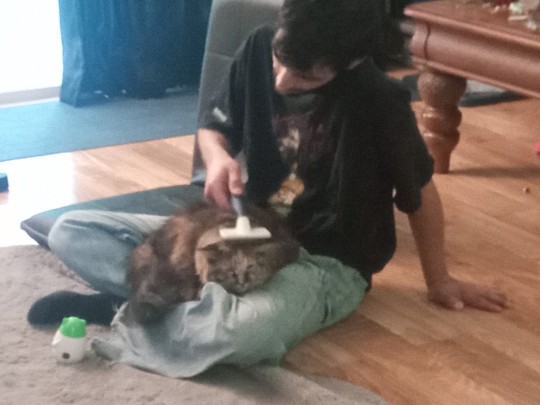

Shadow became the best friend I ever knew. Not a night went by where she wasn't under my covers sharing the pillow with me, laying stretched out on her back or side as the little spoon. If she wasn't in my bed, she would sit at the door to the bedroom, guarding me or in a chair next to me, always watching. I could do no wrong in that cat's eyes. She was the highlight of my day when I got home from every crappy job I had since. A furry coat to soak up the tears shed during long nights of insomnia and depression. An inspiration for my art and spirituality. My familiar and kindred spirit. If I would talk to her, she would respond with chirps and meows like she knew exactly what I was saying. If someone else was in the room giving her attention and I walked in, she would perk up and run toward me like they never existed. Shadow was the second cat that chose me. I have never chosen a cat from a shelter or adoption / rescue facility. This is how I acquired both my childhood furry friend and Shadow.

It all began when I noticed Shadow's fur was sticky and stiff, like she had been sitting in honey. Just the end of her tail at first. She always had this silly habit of sitting in her food tray, so I cleaned it and her and thought nothing of it until the drooling started.
Shadow had always been a drooler, but not to this extent. Drool bubbles would pop from her left lip. One night, when I came home from work before I started my leave to focus on my Etsy shop, I was horrified to find her sitting on the couch with a bloody chin. Now, there wasn't a large amount of blood, but this alarmed me significantly. It was time to see a vet, like, yesterday. Thankfully, my shop sales had been great and I didn't have to fret over the bill- I was ready to pay whatever it was to make her feel better.
The vet confirmed what I knew deep down and didn't want to acknowledge because the thought was just too painful. Cancer. No chance of survival even if I wanted to go through the hell of treatment, which involved removal of the tongue and jaw. I brought Shadow home and cried, hoping for the best -that the antibiotic would work. The vet said she had been wrong before, it could just be an abscess and it would heal. Shadow was still doing cat things. Shadow was still my best friend, she still loved me, she was still trying to cuddle me at night and surrounding me with the reminder of death in the odor of her breath.
Yesterday, I brought Shadow in to be put to sleep. The decision was made when I looked up from making a rune set and saw puddles of blood on the floor, a stream of it from her face as she was sitting in the window sill. I have never felt so heartbroken. Not even at a family member's funeral. I asked to bring her home, burying her under the tree where I buried my last cat and childhood familiar, Elmo. When I saw the standard biohazard bag peeking up through the dirt, I knew that was where she belonged. With her sister. Yesterday, my heart was buried with that cat. Eleven years was not long enough but each one filled with so much love and happiness. I stood with her until the end. The only peace I feel is that I know that she is no longer hurting. I know she knew I loved her.
I miss you Shadow. To those of you who have recently lost your best friend, your familiar or the love of your life, my heart goes out to you. I hope that someone else can read this and share my pain. I understand that there was nothing I could do but love her. Love your pets. Love them as long and as well as you can- nothing is immortal. We accept this when we commit to caring for our (mostly) furry (sometimes scaly or feathery) friends. This doesn't mean that it hurts any less when we lose them.
To my customers, who have been patiently and diligently awaiting orders while Etsy forced hiatus on my shop, preventing sales during this crisis in addition to my sister in law's wedding and me poking my own eye out back and February- you all are really the best turn of luck I've had. You do not know how much I appreciate you allowing me the time to spend these last few precious moments with her. It truly means the world to me and I hope at the end you receive something worth your time and patience. I have not forsaken fulfillment, and orders are still shipping. Unfortunately, I NEED to reopen and accept new orders, as Etsy is demanding payment for $600 worth of shipping labels. My shop is still appearing as in hiatus at the moment, but I ask for all the support my friends, supporters and followers can offer at this time as I essentially will be working for free when I reopen to pay these fees. Great, right?
If you are awaiting refunds, there is literally no money in the account associated with Etsy. However, as the funds become available, I will be processing refunds / cancellations. I'm sorry for the delays, I never thought I would say I found success at the worst possible time. I urge the rest of you- if you have a deadline for your order for the love of goddess TELL ME. I am getting a little frustrated with buyers (who are frustrated with me, understandably, but still, my item descriptions are clear about relaying deadlines) who are upset or complaining about meeting gift deadlines or other deadlines I literally had no idea about. I'm a decent psychic, but not perfect.
~ Samantha
(Owner/Designer/Creator blursedbaubles.etsy.com)


#cats in boxes#handmade#witchcraft#funny cats#rescue cats#witch familiar#familiars#text post#witchy#witch stuff#ecletic pagan#witch shop on etsy#memorial#remember#cat story#dealing with grief#grief journal#spirit animal#animals#happy pets#pet pics#cats#paganism#crystaljewelry#crystals#witchblr#wiccan#witch cat#witchs familiar#witches of etsy
13 notes
·
View notes
Text
Is it just me or is Dani looking more shiny and clean than usual in the rooftop clip haha
I have many mixed feelings on this story line. I’m an Arab Muslim but I’ve lived almost my entire life in the US, and I’m not very knowledgeable on the more religious accuracy aspects. Besides that, I’m just not sure what the takeaway of this relationship is supposed to be.
Long meaningless rambling under the cut.
I’ve only seen the OG SKAM before this, so I can only compare to that version of Yousana. But my impression was that Yousef and Sana were very strong on a few fronts - cultural context, history, and shared values. The conflict was over religion as a practice or moral philosophy. Things conclude on a fairly positive open ended note, despite this.
So how does that compare to Damira? Dani doesn’t have a shared cultural context with Amira, at least when it comes to her religion and background. Not much evidence he is actively trying to remedy some of his ignorance. Or at least, evidence that he is eager to do so.
He does have an established friendship and history with her, but I feel the show wants us to accept that as fact rather than show us many meaningful examples. I’ll give them the benefit of the doubt there, though.
To be honest, I’m not sure at all if Dani and Amira have many shared values. Yousef made a point of taking a hit for Sana when it came to her parents suspecting drinking. So far, I don’t think Dani has taken any hits on Amira’s behalf, and that’s not for lack of opportunity. She continues to shoulder much of the burden.
Additionally, I really don’t jive with the concept of befriending people who treat others badly. It’s not even like most of his friends were respectful and polite, it’s that most of them were not. What does that say about Dani? That his concern is chiefly with how his friends treat him rather than how they treat others? What exactly does he value from these friendships? And as many people have pointed out, his joke about the kid still hasn’t been properly addressed. Does that mean we shouldn’t perceive this as a possible mismatch of his and Amira’s values?
Finally, the conflict aspect is different this time around. This is probably the only realm I think could be an interesting ‘benefit’ of choosing the Dani route for Yousef. In the OG, Yousef seems to have had his experiences with organized religion and definitively chosen to discontinue participation. For Dani, he has also had his own experiences with organized religion, but perhaps hasn’t felt any particular need to really commit one way or another. In fact, it seems that Amira’s own conviction in her faith is part of his attraction to her (note: they need to be very careful with this). Maybe he has found some sort of kinship with her on some level, in a way that encourages him to think about things differently.
So, where Yousef made a conscious decision to leave religion, here is a chance for Dani to make a conscious decision to join it. His relative ambiguity allows Amira to explicitly say that conversion would eventually be on the table, if they pursued a relationship. Why not explore this route, then? Not converting solely for Amira’s sake, but being inspired by her to start that kind of spiritual introspection within himself. I wish the dialogue would hint that maybe the reason Dani began to consider Amira in this light was because these were things that he did think about, but couldn’t share with other people he knew.
Some might say that this isn’t realistic. Why not? And why is Amira’s relationship confined to strict 'realism’? How many people in real life actually marry their high school sweetheart? Yet there are no problems with accepting other ships as 'endgame’ for all intents and purposes (within the show canon). I don’t think it’s fair that those relationships are portrayed as strong or developed enough to go the distance (these are still just a bunch of teens) but a Sana relationship is too challenging or 'mature’ to maintain.
If a lot of these ships can be fanfic-y or wish-fulfillment flavored, why not give Amira a relationship that isn’t painted as DOA (this is of course, notwithstanding the giant missed opportunity w/Kasim, but I’m not even going to go there)? Yes, Amira wants different things from a relationship than other characters. And perhaps she is satisfied being single. My issue is giving her the possibility of a loving relationship that respects her boundaries only to take it away from her, like she was asking too much. I know 21 year old white guys like Dani will have difficulties with this different style of relationship. But if it ends badly, to me it will almost read as a cautionary tale. If it’s so obviously an exercise in futility, why should I be invested at all?
I want the show to say that Dani believes Amira is absolutely worth it, not 'eh I was celibate for a few weeks and I’m not feeling it.’ That would also make both Dani and Amira look incredibly naive, if both acknowledge that they can only interact physically after marriage, yet still start dating now (doubt they plan to marry any time soon). So does the show mean to punish Amira for this naivety? I would much rather they provide a hopeful resolution, even if people say it’s 'unrealistic.’
Obviously pursuit of a relationship shouldn’t be the sole motivating factor of a major lifestyle or behavioral shift. But careful framing of Dani’s decision making and helpful insights into his mindset could avoid this. I know it would be perfectly fair for him to conclude he isn’t ready to commit to anything serious at this stage in his life. But…being that this IS a fictional story written by real people (with their own biases and preconceptions), there is a message that could be interpreted there…that Amira is, in fact, not worth the effort.
I’m also not sure what Dani’s expression meant when he was watching Amira take a drink from the bottle. I think it was a look of realization, but I’m not convinced that was necessarily realization of love or respect or something like that. I know it’s supposed to basically mirror the OG breaking fast scene, but the circumstances are different enough that I can’t assume Dani feels like OG Yousef did. Often times I get the vibe that Dani doth protest too much when he reassures Amira.
True, the season is only half over so my opinion could change. It’s just that, I don’t doubt that Dani and Amira have chemistry, enjoy each other’s company, and are very comfortable with each other. But I doubt the… substance? Content? Of Dani’s feelings for Amira. And I don’t even know if that’s intentional, or me being overly suspicious of the writing or what.
For me to think there is potential for real love at some point, I would need to feel that these two people very much want to protect each other and look out for each other’s well being. For Dani to merely accept or even admire Amira’s faith isn’t enough to sustain anything. It’s not just about being content in your own bubble, but about being partners and reinforcing that bond outside of it. I’m just trying to contextualize Dani’s approach to and motivations for this relationship, and at the same time validate Amira’s own wishes for herself and ensure that Dani is capable of fulfilling those needs.
I really like Damira. I am *really, really* rooting for them to work. I think they have a lot of untapped potential and a great tender affection for one another. That’s what makes me nervous that the show will pull out the rug from under me.
36 notes
·
View notes
Photo
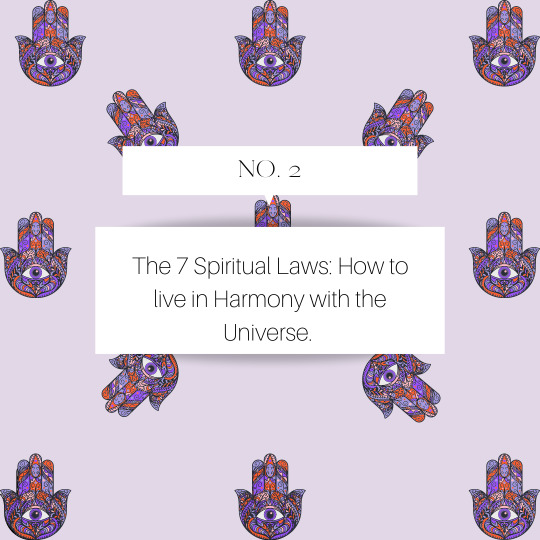
The 7 Spiritual Laws: How to live in Harmony with the Universe.
Just as there are physical laws for example the law of gravity, there are also laws that influence us mentally and especially emotionally while having an effect on our lives: the 7 spiritual laws of the universe.
These laws are also called the Hermetic or Subtle Laws. It is the laws according to twitch the universe works and since we are part of the universe, these laws also work for us. If we want to or not. They are like an inner guide who will help you to find your center again and to be aware that there is always and at all times a divine power that guides you and that you carry within yourself.
It has helped me to understand and learn, it supported me to create order within myself, and enabled me to act in harmony with the universe and create life according to my vision and my wishes.
WHY YOUR LIFE WILL CHANGE IF YOU APPLY THE 7 UNIVERSAL LAWS
The 7 Hermetic Laws are based on simple fundamentals:
All that is energy, your thoughts as well as your body. Because of the different densities, we just perceive this energy differently. The law of the universe exists and always, works at any time of the day or night. It doesn’t matter whether we act in harmony with them or not. However, we quickly sense when something is out of balance.
The laws run in parallel. If we ignore on law, we ignore everyone else.
It is the universal force that works behind everything and maintains the universal order. We cannot change anything in these laws or override them. The only question is to what extent we are aware that they exist and to what extent we shape our lives in accordance with these laws.
As long as we do not accept the 7 Laws, something always happens that we do not understand and for which we look for the cause on the outside or think that we are powerless.
But when we consciously create harmony with this universal force, incredible magic unfolds in our lives. The more you start to act according to these laws, the easier your life becomes because you recognize connections way quicker and manifest the things that you really want in your life way faster..
I have started to observe deeper in myself and in my circle of friends that we have completely different attitudes towards life when we act according to the 7 universal laws.
Because then we no longer fight against anything, but suddenly trust and flow.
The 7 spiritual laws of the universe
All 7 laws at a glance:
Law of Spirituality
Law of Correspondence
Law of Vibration
Law of Polarity
Law of Rhythm
Law of Cause & Effect
Law of Sex
1. The law of spirituality
The first universal law says that everything is spirituality or consciousness. Everything you see around you was initially thought (i.e consciousness) as subtle energy until it became a visible result as gross energy.
You determine your life through your inner attitude of mind. Every thought, positive or negative, creates your reality. Many people change their external circumstances if they are not satisfied with their life for example new partner, new apartment, new job. But this way you will always come to the same starting point. If you want to change something in your life you first have to become that in your inner world, i.e. in the level of consciousness.
Specific application to act in accordance with this law:
Your inner world creates your outer world, become and create what you desire inside to manifest outside.
2. The law of correspondence
The law of correspondence is also often referred to as the law of attraction. This law is about: same always attracts the same. As Inside, so outside: as outside, so inside. What you give your receive again.
Your inner life is reflected in the outer experience, and these outer experiences will in turn reinforce your beliefs within. If you are angry inside or full of fear, you will also perceive more anger and fear on the outside and thereby reinforce these feelings in you again. Of course, it is also the other way around: If it is your deep inner conviction that you are happy and fulfilled, you change your focus, magnetically attract happiness and abundance and become even happier and more fuliflled.
Specific application to act in accordance with this law:
Be in yourself what you wish for on the outside. For example, if you want to have more joy and abundance in your life, be more joy and abundance.
3. The law of vibration
Everything in this universe is energy and in constant motion. Energy always moves at a certain frequency of oscillation. If you feel fear, anger, or shame, you are in a lower vibration. As soon as you feel love, joy, and gratitude, you will be able to perceive a higher vibration. You can perceive the difference through the lightness or the heaviness that you feel depending on your emotional state.
Depending on whether you are on the vibration of abundance or lack and send this energy outwards, you will attract and receive this vibration. If you think to yourself “I want to have more money / another job / …”, you are vibrating in the frequency of lack. However, when you are within yourself in deep gratitude and joy that what you want is already there, you vibrate on the frequency of abundance.
This law will also help you realize that you cannot hold on to your past or expectations. Everything is in constant motion and therefore also in constant change. Don’t waste your strength holding onto something; let go of it. Surrender to the flow of life.
Specific application to act in accordance with this law:
Take the inner attitude that what you want is already there. So you vibrate on this frequency of abundance instead of lack.
4. The law of polarity
The law of polarity says that everything has two poles. Seen universally, these poles are not differences, but merely states of one and the same thing. One and the same thing has two levels of vibration. There is no “or”, but always an “and”. Means: Everything is already there!
Examples:
Money – poor and rich
Physical well-being – sick and healthy
Feelings – hate and love
If you are poor, sick, or in hate, you already have wealth, health, and love at the same time. You can consciously choose which pole you want to move to through your consciousness, your thoughts, and feelings.
Specific application to act in accordance with this law:
Realize that you can always wander between the poles. If you want to go to the other pole, adjust your vibration.
5. The law of rhythm
Everything in this universe has a certain rhythm: day and night, inhaling and exhaling, being born, living, dying, and being reborn. The law of rhythm gives us the understanding that everything in our lives and in the universe always moves in a natural cycle. The 5th law connects the 3rd law of oscillation with the 4th law of polarity. Energies always move rhythmically between connected opposites.
Be confident that after a low or a crisis there will always be a high. Allow yourself breaks after you’ve worked hard. Give your body and mind plenty of sleep after you’ve been awake for a long time and have exhausted yourself.
This law also shows us so beautifully that everything is in constant motion and change and that there is no point in holding on to something.
Specific application to act in accordance with this law:
It is needed for your life that you move in the rhythm of life.
It is very important to me that you do not compare or adapt yourself to the rhythm of others, but that you understand that your life has its own rhythm because you have your own universe within you.
6. The law of cause & effect
The 6th universal law says that …
every cause has an effect,
there is no effect without there being a cause and
no effect remains without there being a cause for it.
If there is an effect in your life that you are dissatisfied with, you can trace back the cause of it. In this way, you know what you have to change at the causal level in order to achieve the desired effect.
You can also think of this law as seed and harvest. Through this law, you can see very clearly that you are the creator of your life. So take responsibility and see exactly what you want to harvest.
Specific application to act in accordance with this law:
Acknowledge yourself as the creator of your life and think about the cause it takes to experience a certain effect.
7. The law of sex
The law of gender makes it clear that everything in this universe has both male energy and female energy. This principle does not refer to sexuality or physical gender, but to the archetypal characteristics of the sexes.
The male energy stands above all for understanding, doing, goal-oriented, focus, control. The female energy stands for intuition, receiving, process-oriented, creativity, trust.
Both genders are equal and need to be in harmony or balance so that something can develop completely.
Specific application to act in accordance with this law:
Integrate both the male and female energy in you, because only in this way can you come into your full creative power and create the life you want to live for yourself.
Your outer universe is always a reflection of your inner universe.
Exercise: Connect with the power of the universe
If you want to connect more with the laws and create your life in harmony with them, I have an exercise for you here. It helps you to become aware of the extent to which you are currently using the power of the universe and how you can bring it even more into your life.
ANSWER THE FOLLOWING 3 QUESTIONS ABOUT EACH LAW:
How do you live in accordance with this law?
In which areas of life and situations can you connect even more to this law?
What are 3 steps you can take to act even more in accordance with this law?
#spiritual#journey#trippy#blog#follow#follow me#universe#affirmation#believe#faith#peace#good vibes#energy#healing#chakra#positive#positive life#mindeset#moving forward#love#live
3 notes
·
View notes
Text
Powerful Dua to Get Married to a Specific Person
Are you deeply in love with someone and dreaming of marrying them? In the journey of love, sometimes we find ourselves longing for a specific person to share our life with. When conventional methods of courtship seem insufficient, turning to the spiritual realm for guidance can offer solace and hope.
Islamic tradition provides a profound avenue through which believers can seek blessings and guidance for matters as crucial as marriage. Among these spiritual practices, dua to get married to a specific person (supplication) holds a special place, offering a direct channel to communicate heartfelt desires to Allah.

Understanding the Significance of Dua in Marriage
Dua is not merely a ritualistic act but a powerful means of expressing one's deepest aspirations and seeking Allah's favor. For those yearning to marry a specific person, Islamic teachings offer supplications that are believed to invoke Allah's mercy and blessings upon the desired union. It's a spiritual practice rooted in faith and humility, acknowledging that ultimate guidance and decisions lie with Allah.
Dua to Get Married to a Specific Person
Powerful Dua to Get Married to the Person You Want:
One of the most revered supplications in this context is to recite specific verses from the Quran and to invoke blessings upon the Prophet Muhammad (peace be upon him). The recitation of Durood Shareef, followed by heartfelt prayers, is believed to attract Allah's divine intervention in matters of the heart.
Wazifa to Marry a Specific Person:
A wazifa is a form of Islamic prayer involving specific verses or phrases repeated a certain number of times. In the quest to marry a specific person, believers often turn to wazifas that resonate with their intentions and invoke Allah's guidance and approval.
Dua for Getting Married to the Person You Want:
This supplication emphasizes the sincerity of one's intentions and the humility in seeking Allah's will. It reflects the profound belief in Allah's power to grant what is best for us, including the companionship and love of a specific person.
Steps to Perform the Dua
1. Perform Ablution (Wudu): Before embarking on any dua to get married to a specific person, it's essential to cleanse oneself physically and spiritually through ablution, symbolizing purity and readiness to communicate with Allah.
2. Recite Durood Shareef: Begin by reciting Durood Shareef nine times. This act honors and seeks blessings upon the Prophet Muhammad (peace be upon him), aligning one's supplication with the divine example.
3. Recite Quranic Verses: Specifically, verse 19 of Surah At-Tawbah holds significant spiritual weight in seeking Allah's blessings for marriage. Reciting this verse with sincerity and devotion reinforces the intention to marry the specific person you desire.
4. Recite Ayat: Repeat specific verses or phrases from the Quran, such as Ayat Al-Kursi or other verses that resonate with your intention to marry a specific person. The repetition of these verses amplifies the spiritual connection and reinforces faith in Allah's divine plan.
5. Offer Sincere Prayers: Finally, pour out your heart in sincere prayers to Allah. Express your love, intentions, and hopes for marrying the specific person. Trust in Allah's wisdom and timing, knowing that He listens to every earnest supplication.
Conclusion
In the journey of love and marriage, dua serves as a profound spiritual tool, offering solace and hope to those seeking Allah's blessings to marry a specific person. It encapsulates the belief that Allah's guidance and decisions are paramount, and through sincere supplication, believers can find peace and fulfillment in their heartfelt desires.
If you are longing to marry a specific person and seek Allah's blessings, consider incorporating these spiritual practices into your daily life. Trust in Allah's divine plan, and may your sincere dua bring you closer to the love and companionship you seek.
For more insights and guidance on powerful duas and wazifas for marriage, visit [ReciteDua.com](https://recitedua.com/dua-to-get-married-to-a-specific-person/). Embrace the spiritual journey towards a blessed union with the person you love, guided by faith and devotion.
1 note
·
View note